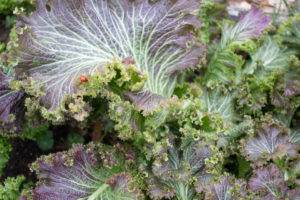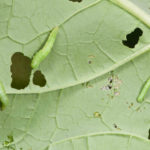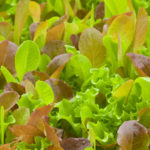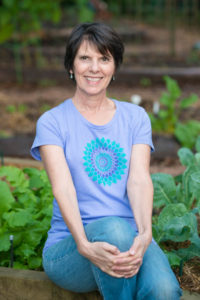October is for Establishing the Fall Vegetable Garden
By October the fall vegetable garden should be rocking and rolling!

Colorful mustards, kale and chard are attractive additions to the fall landscape.
The arrival of fall in Central Texas brings cooler temperatures and the potential for more dependable precipitation, both of which revive the pleasure of vegetable gardening. This is the best month to get cool season vegetables in the ground and growing vigorously before cold weather sets in. Remember that vegetables need sunlight to thrive. Lettuce, arugula and other leafy greens may produce adequately in less than full sun conditions but generally the more sun the better as we move into fall with shorter days and less intense sunlight.
Plant Cool Season Crops

Kohlrabi is a versatile vegetable that is good raw or cooked.
If you haven’t planted any cool season crops for your fall vegetable garden, now is the time. Transplants of Brussels sprouts, cauliflower, broccoli, cabbage and Asian greens should be available for purchase at local garden centers. Directly seed turnips, radishes, kohlrabi, beets and carrots right in your planting beds. They make good candidates for a square foot garden, raised bed culture, or container gardening. Kohlrabi can be quite ornamental in the garden and a conversation starter for those who are unfamiliar with it. Grow it for its bulb-like enlarged stem that develops just above the soil and is ready for harvest about 2 months after planting. It is a versatile vegetable for roasting, mashing, sauté or thinly sliced for salad or slaw. Cook the edible leaves just like collards.
Watch Out for Hungry Caterpillars

Inspect plants regularly for caterpillars that can severely damage leaves of cole crops. Use row cover or netting to protect plants from egg-laying moths.
Be on the lookout for cabbage loopers and cross-striped cabbage worms on broccoli, cabbage and other brassicas. That little brown and beige moth that flits around your newly planted cole crops is the mama. These ravenous caterpillars can devour a leaf (or leaves) in no time and they start out so tiny you hardly notice them. Carefully inspect the underside of leaves and hand-pick or treat with products containing Bt or spinosad. These are persistent pests so regular monitoring is necessary.
Vegetable Gardener Checklist for October:
Here is the vegetable gardener’s checklist for October (for more gardening chores, see the Monthly Gardening Calendar.)
Planting
-
-
- Plant garlic now for harvest next June. Separate cloves and plant each one pointy side up, 2” deep and 6” apart. ‘Texas White’ and ‘California Early’ are softneck varieties that do well in Central Texas.
- Plant lettuce and spinach, either from seed or transplant. When seeding directly in the garden use a thermometer to check the temperature a few inches below the soil; seeds germinate best when soil temperature is below 75°. For seeding directly into the garden press seeds into moist soil and barely cover. Thin to the proper spacing after they emerge and enjoy the thinnings in a salad.

Grow your own tasty mesclun for salads.
- Grow your own mesclun in the garden or in a container right outside the back door. Purchase seeds mixes or make your own by combining seeds of different lettuce varieties with similar days to harvest. Scatter the seeds over moist soil and press lightly. They will germinate in 6-10 days and tiny leaves will be ready to harvest about a month later. Plant a small section every couple of weeks for a continual harvest over the winter.
-
Additional Resources
Recommended Vegetable Varieties for Travis County

